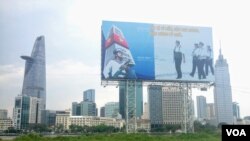There is not often good news coming out of the territorial disputes of the South China Sea, but Vietnam, in its tensions with China, could take solace in recent remarks from some of Washington’s high level emissaries, who have given a boost to the Southeast Asian nation.
At the highest level is Michael Pompeo, U.S. Secretary of State, who on Thursday expressed remorse at the many ways his nation looked the other way during what he called China’s “hostile” ascendance and “intransigence,” including as it affected Vietnam. His remarks were consistent with the view of observers who believe in hindsight the U.S. made a fatal miscalculation, tolerating China’s human rights abuses because it thought that with a more open economy, China would open up to democratic reforms, too.
“We hesitated and did far less than we should have when China threatened its neighbors like Vietnam, and like the Philippines, and when they claimed the entire South China Sea,” Pompeo said in a speech in New York City.
These are among the Asian nations that have overlapping claims to the South China Sea, where observers fear physical battles could break out over valuable shipping lanes and oil.
Beijing claims about 80 percent of the sea. It is only one of the many instances Pompeo gave of China’s poor conduct that went unopposed. He said the U.S. did not speak up enough after Tiananmen Square, after Taiwan struggled to maintain sovereignty against China, and after China became a World Trade Organization member without playing by fair trade rules.
He said “we accommodated and encouraged China's rise for decades,” even at the expense of democratic values.
The remarks were a word of encouragement for Vietnam as it has spent years going back and forth, trying to maintain its maritime sovereignty. Every few months a development big or small affects the political calculation in the South China Sea.
Most recently, that development was “Abominable,” a Hollywood movie and an appropriate adjective for Vietnam’s reaction to it. The animated movie includes a map that shows the South China Sea as if it were the territory of Beijing. Vietnam removed the movie from theaters last month. The Philippines soon followed its example. This was a notable decision for Manila because in the past, President Rodrigo Duterte has been more accommodating of Beijing and less interested in prosecuting Philippine claims to the South China Sea.
This was also around the same time that Vietnam got a word of support from another official at the U.S. State Department. Assistant Secretary of State in the bureau for East Asian and Pacific affairs David Stilwell said he doesn’t want China to insincerely agree on a code of conduct in the South China Sea, just to “legitimize its egregious behavior and unlawful maritime claims.”
“While claiming that they are committed to peaceful diplomacy, the reality is that Chinese leaders – through the PLA [People’s Liberation Army] navy, law enforcement agencies, and maritime militia – continue to intimidate and bully other countries,” he told a Pacific subcommittee of the U.S. Senate Foreign Relations Committee in October.
“Their constant harassment of Vietnamese assets around Vanguard Bank is a case in point.”
Nations have tried to negotiate a code of conduct for years. This weekend Thailand hosted a meeting between China and the Association of Southeast Asian Nations. While in Bangkok, Vietnamese Prime Minister Nguyen Xuan Phuc told his counterparts of the need for such a code. He also said neighboring countries should not do anything to further “complicate” the maritime situation.
“The leaders emphasized the importance of maintaining a peaceful, secure, stable, free, and safe maritime and aviation environment in the South China Sea,” a summary of the meeting on the Vietnamese government’s official news site said, “refraining from taking actions that complicate the situation.”











